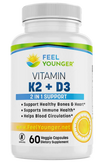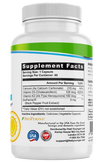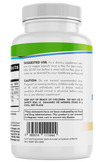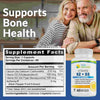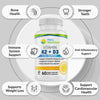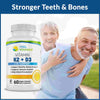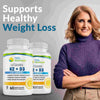Boost your wellbeing with our Vitamin D3 & K2 blend. Known for supporting bone health and aiding in calcium absorption, it’s a simple way to promote your body's overall vitality. A sunbeam in a capsule!
Vitamin D3 5000iu + Vitamin K2 1000iu MK7
Boost your wellbeing with our Vitamin D3 & K2 blend. Known for supporting bone health and aiding in calcium absorption, it’s a simple way to promote your body's overall vitality. A sunbeam in a capsule!
- Product Description
- Supplement Facts
Would you like…
- Better Bone Health
- Immune System Support
- Improved Mood
- Improved Heart Health
- Anti-Inflammatory Support
- Support Losing Weight
If so, you may want to give our Vitamin D3 5000iu + Vitamin K2 1000iu MK-7 a try!
Our Vitamin D3 with K2 can also potentially give you a whole host of additional benefits such as:
- Increase Muscle Strength & Repair
- Increased Longevity
- Improved Brain Function and Memory
- Improved Dental Health
- Brain Protection
- Promote Proper Blood Clotting
- UV Protection
- Reduced Chance of High Blood Sugar Levels
What is Vitamin D3?
Vitamin D is a fat soluble vitamin that our body requires in order to absorb calcium in the gut, as well as regulating calcium and phosphorus for bone mineralization [1].
Vitamin D is also incredibly important in the regulation of mood, prevention of cardiovascular problems and improving heart health, lowering pro-inflammatory and increasing anti-inflammatory components of the immune system, supporting weight loss, supporting bone health and more.
There are two main types of vitamin D - D2 and D3. D2 can be found naturally in some plants, whereas D3 is naturally formed in animals when their skin is exposed to sunlight. The difference being that D3 is roughly 87% more potent at increasing blood vitamin D levels and maintaining concentrations. D3 also provides 2-3 times more storage of vitamin D in the body’s cells than D2.
For example, a study on older women found that a single dose of vitamin D3 was almost twice more effective than vitamin D2 at increasing calcifediol levels [2].
Vitamin D3 is indeed synthesized in your skin too when directly exposed to the sun's UV rays [3], specifically the ultraviolet B rays that are responsible for sunburn. When the UVB rays interact with a protein in your skin called 7-DHC (7-Dehydrocholesterol), it is converted into the active form of vitamin D (D3) that is then absorbed into your body [4].
While the sun is an extremely important source, most people do not get enough sun on their bare skin throughout the year, so you should also acquire vitamin D3 from foods, such as fatty fish (such as mackerel, sardines, salmon and tuna), cod liver oil, egg yolks, but this is also often difficult, which is why many people prefer to supplement Vitamin D3 [5].
What causes Vitamin D deficiency?
A variety of factors can lead to vitamin D deficiency - the main being simply not getting enough sunlight. Here are some of the reasons you may not be getting enough vitamin D:
- Not exposing enough of your body for long enough (15 minutes in the sun wearing nothing but underwear will provide enough vitamin D for the day)
- Sitting in the shade - it’s important to understand that your exposed skin needs to be in direct sunlight
- Using sunscreen which blocks the UVB rays needed to synthesize vitamin D
- Living in areas where the sun is blocked, like cities with tall buildings
- Living in countries where there isn’t much sun, or working night shifts so you don’t see much sun
- Winter in most countries (when the sun isn’t as strong/doesn’t appear often)
- Having darker skin (the darker your skin, the less able you are to absorb vitamin D due to the higher melanin content)
If you’re deficient in vitamin D, a variety of problems can occur such as:
- Rickets (children) or Osteomalacia (adults) - distortion and softening of the bones [6]
- Low mood [7]
- Increased risk of cardiovascular problems [8]
- Increase risk of bone fractures and breaks from falls [9]
- Tiredness, pains and aches
Can you test your levels of Vitamin D?
If you suspect you have low vitamin D levels, or simply want to find out what your levels are - your doctor can perform a simple blood test. You can also order this test for yourself privately in most locations, we recommend this as it’s very important to have the optimals levels of Vitamin D3, not too little, not too much.
If you are found to be deficient, your doctor may also want to perform x-rays to check the strength of your bones.
What is Vitamin K2?
Vitamin K is another fat soluble vitamin that is essential for the metabolism of calcium, blood clotting, heart health, bone health and many other functions in our bodies [10].
The two types of vitamin K are K1 and K2. K1 is a plant form and can be found in some green vegetables, whereas K2 can be found in fermented and animal foods. Vitamin K2’s long side chain allows it to remain in the blood and circulate for longer, making K2 the best form of vitamin K. Where K1 might stay in the blood for several hours, K2 can remain in circulation for days [11].
It’s vital that you take vitamin K2 when taking larger doses of vitamin D, but more on this later.
Why you should always take Vitamin K2 alongside D3…
It’s absolutely essential to take vitamin K2 alongside vitamin D3 for a couple of reasons. The main reason is that it's much safer to take higher doses of D3 with K2, because too much D3 by itself will pull calcium out of your bones, leading to lower bone density. Excessive vitamin D3, without K2, may also lead to calcium being deposited in your arteries, causing hardening of the arteries (vascular calcification).
Vitamin K2 works to put calcium back into your bones [12], as well as helping to keep your arteries clear. A balanced formula with both allows you to reap the anti-inflammatory, immune supporting and other benefits of vitamin D3, while minimizing bone calcium loss and the potential for cardiovascular problems.
Why Try Feel Younger® Vitamin D3 5000iu + Vitamin K2 1000iu MK7?
Our vitamin D3 5000iu + vitamin K2 1000iu MK7 capsules are antibiotic free, gluten free, sugar free, hormone free, lactose free and contain no nasty binders.
We use a type of K2 called MK-7 which is a step up from the normal K2 you’ll find in many other K2 supplements. MK-7 has higher efficacy due to its higher bioavailability and longer half-life than other versions of vitamin K2 [13].
We’ve also included Bioperine (a patented black pepper extract) in our vitamin D3 with K2 formula because of its ability to increase nutrient absorption [14].
Bioperine in itself also possess potential health benefits, such as boosting brain function by decreasing inflammation [15], improving memory and protecting the myelin sheath [16], anti-inflammatory and antioxidant effects on UV (ultraviolet) induced skin damage [17] and preventing high blood sugar levels [18].
This means when you take our vitamin D3 with K2 capsules, you know that you’re getting the highest quality, best forms of vitamin D and vitamin K that are the most bioavailable (available for your body to use) and last the longest in your body (longer half-life) and are going to be absorbed exponentially better than other D3 with K2 products due to our Bioperine content.
Here at Feel Younger, we believe in providing strong doses at reasonable prices. Our vitamin D3 with K2 capsules provide a 6,000mg dose per capsule, and will cost you no more than $19, with discounts available on subscriptions for multiple bottles.
How do you take it?
Take one capsule a day, preferably with some kind of dietary fat to help better absorb the vitamins.
Any cautions?
Although vitamin D is tolerable in high doses, (10,000 iu & upwards) it’s important to bear your sun time in mind.
If you’ve spent hours in strong sunshine, supplementation may not be beneficial (in rare cases, excessive vitamin D can cause nausea, vomiting, dehydration, confusion and abdominal pain).
Vitamin K is generally considered to be well tolerated and safe but in rare cases, people may experience minor digestive effects.
Scientific References
- https://ods.od.nih.gov/factsheets/VitaminD-HealthProfessional/#h2
- https://www.ncbi.nlm.nih.gov/pubmed/18492750
- https://www.ncbi.nlm.nih.gov/pmc/articles/PMC3356951/
- https://academic.oup.com/jcem/article/96/3/E447/2597204
- https://www.ncbi.nlm.nih.gov/books/NBK56061/#ch3.s2
- https://publications.aap.org/pediatrics/article/122/5/1142/71470/Prevention-of-Rickets-and-Vitamin-D-Deficiency-in
- https://www.ncbi.nlm.nih.gov/pmc/articles/PMC6970300/
- https://www.ncbi.nlm.nih.gov/pmc/articles/PMC2726624/
- https://www.ncbi.nlm.nih.gov/pmc/articles/PMC4427016/
- https://pubmed.ncbi.nlm.nih.gov/21155624/
- https://www.ncbi.nlm.nih.gov/pubmed/17158229
- https://www.ncbi.nlm.nih.gov/pmc/articles/PMC4566462/
- https://www.ncbi.nlm.nih.gov/pmc/articles/PMC7230802/
- https://www.ncbi.nlm.nih.gov/pmc/articles/PMC3634921/
- https://pubmed.ncbi.nlm.nih.gov/26648012/
- https://pubmed.ncbi.nlm.nih.gov/32335165/
- https://pubmed.ncbi.nlm.nih.gov/33091445/
- https://pubmed.ncbi.nlm.nih.gov/29683271/
Antibiotic Free
Gluten Free
All Natural
Sugar Free
Corn Free
Hormone Free
No Binders
This product contains:









